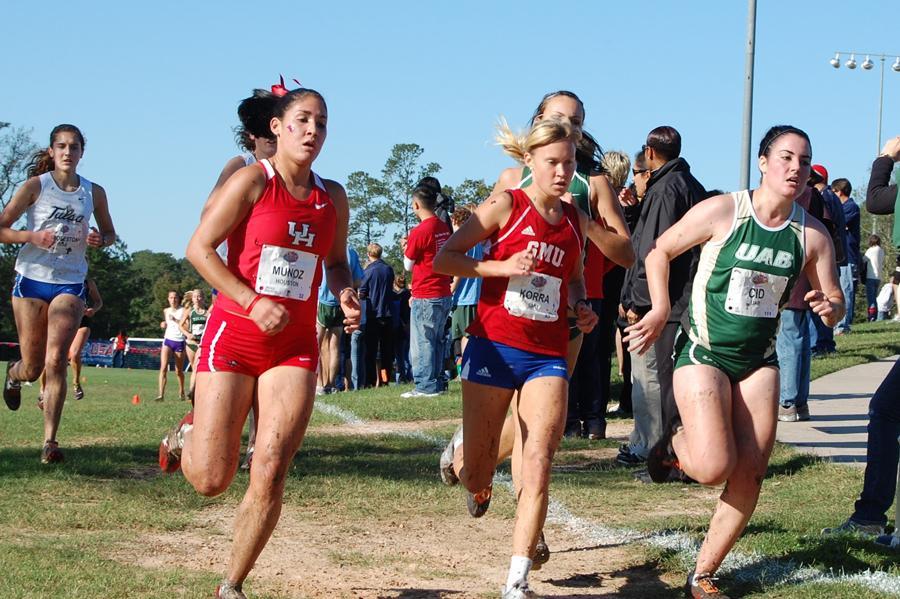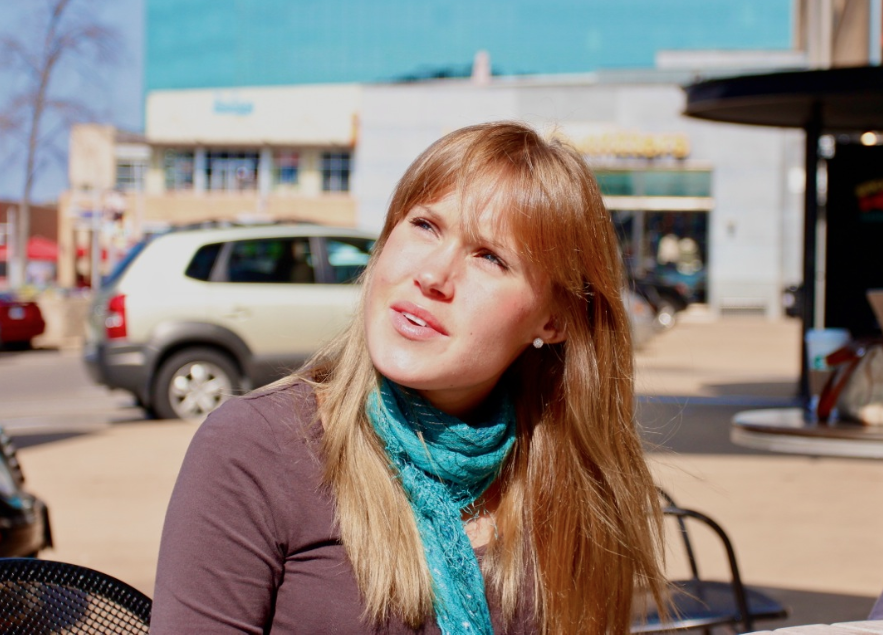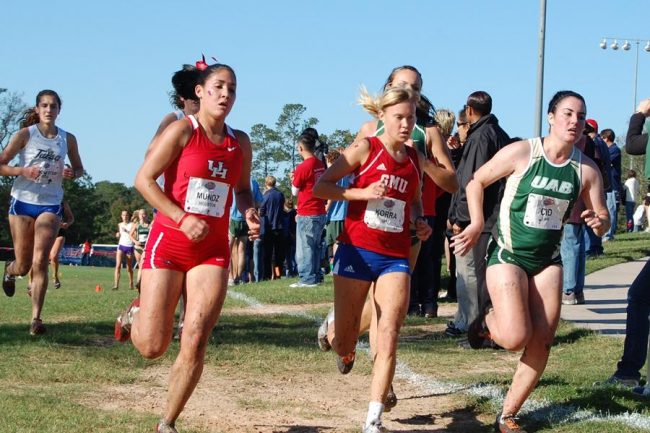
Senior SMU athlete Monika Korra (center) competes in the Oct. 30, 2009 C-USA cross country championship in The Woodlands, Texas. (Courtesy of SMU Athletics )
This is the first of the Rape and Its Consequences series.
Sitting in a corner booth in Cafe Express, Monika Korra sighs and half smiles. “I’m really not looking forward to my U.S. history exam,” Korra, a senior at SMU, said.
If you weren’t paying attention, you might miss her. She is a sliver of a woman, though she moves with an athlete’s grace in her black sweater and pants, gold jewelry and cheetah print scarf. That Korra is fretting over a history exam is nothing short of miraculous given what happened two years ago. On Dec. 5, 2009, Korra was leaving a party with her SMU roommates when three men kidnapped her at gunpoint, holding a gun to her head while they gang raped her for more than an hour then left her naked in the frigid night near the intersection of Haskell Avenue and Crosstown Expressway.
Korra, a native of Norway and a member of the SMU cross country team, did not follow the path of most sexual assault victims. She immediately reported the rape to the Dallas Police Department. She worked with police and the Dallas County District Attorney’s office to build a strong case against her attackers. Her testimony in court helped convince jurors to convict two of the men of aggravated sexual assault; each was sentenced to life in prison. The third pled guilty to aggravated sexual assault and was sentenced to 25 years in prison.
After the last man was convicted, Korra allowed reporters to use her name in their stories. “I don’t want to be defined as a victim,” Korra told The Daily Campus. “I want to show that it is possible to heal from this.”
The men convicted of raping Korra were suspected of being in the U.S. illegally, according to Dallas County jail records. One had been convicted of theft of a human corpse in Laredo, records show. Another recently had been arrested for possession of suspected black tar heroin.
Korra said her role in prosecuting her attackers was central to her recovery. She no longer fears them or worries about what they will do to others. She found peace by helping send them to prison.
“That was my goal: to find them, to make sure they would be locked up and never would be able to do that to anyone ever again,” she said.
Prosecuting someone for sexually assaulting an SMU student is rare. SMU Police Chief Richard Shafer, who has been at the university since 1999, said other than Korra he could not recall anyone accused of raping an SMU student whose case went to trial.
According to SMU crime statistics, 40 women – almost all of them students – reported being sexually assaulted since 2006.
Nationally, if a rape is reported, there is a 50 percent probability a suspect will be arrested, according to the Rape, Abuse and Incest National Network (RAINN). If a suspect is arrested for sexual assault, RAINN found there is an 80 percent probability of prosecution.
Erin Hendricks served as the lead prosecutor in Korra’s case.
The SMU Law School graduate, who worked in the district attorney’s office from 2002 to 2010, found Korra’s tenacity inspiring.
“She was all mental discipline all the time,” Hendricks said. “She never took her eye off the ball.”
The Attack
The night of Dec. 5, 2009 was cold. Korra and her roommates attended a soccer team house party in Old East Dallas. The three left around 2:10 a.m. A friend was waiting in a car. As they ran through the icy air, a black Ford Expedition hurtled toward them. Korra heard someone screaming in Spanish. She turned to the driver, thinking he needed help.
“Before I knew it, there were two men behind me, and they grabbed my head at gunpoint,” she recalled.
The men dragged Korra into the SUV and drove off. Court testimony would show their leader was Arturo Arevalo, a convicted felon and admitted gang member. Arevalo held Korra at gunpoint, her face pressed against the floor. Arevalo and his companions, Alfonso and Luis Zuniga, threatened to kill Korra if she tried to resist.
“They kept saying, ‘Give us what we want or we’ll shoot,'” Korra recounted.
For 80 minutes, the three men took turns raping her. Korra recalls how Arevalo forced her to sit in his lap, look him in the eyes and kiss him.
Korra willed herself to remain focused.
“I knew the gun was present, so I just had to give them what they wanted to save my own life,” she said. “I told myself, ‘Just stay calm.'”
Finally, the three stopped assaulting her and slowed down the SUV. They kept Korra’s shoes and phone and put duct tape over her eyes, according to Korra. Then they shoved her out of the moving car, flung her dress out and screamed at her to run, according to court records. Korra ripped the tape off, threw her dress on and began running. She was barefoot.
“I ran for a while, because I didn’t know what else to do,” she remembered. She knocked on the doors of nearby houses; no one responded. In desperation, she walked into the middle of a busy street. A driver stopped to help.
“I told him, ‘I’ve been raped, call the police, please help me,'” Korra recalled.
The Dallas Police Department responded immediately. Senior Cpl. James Shivers, a 21-year veteran, was the first to arrive. He saw Korra, “elbows and knees all skinned-up with duct tape in her hair,” surrounded by dark figures. Cpl. Shivers, who was not wearing his police uniform, drew his gun and approached Korra. She backed away, screaming, “Don’t hurt me, don’t hurt me,” while a police helicopter hovered overhead.
Shivers had to virtually sh
ove his badge in Korra’s face to convince her he was a cop. Finally, she relented, took the corporal’s jacket and got in a squad car to get warm and give her statement. Police then took her to Parkland Memorial Hospital for treatment.
“She’s the only victim I’ve remembered the name past a call,” Cpl. Shivers said. “She’s extraordinary.”
Police arrested Luis Zuniga on a drug possession charge and found Korra’s cellphone in his pocket on Dec. 6, according to court records. Two days later, police arrested Arevalo and Alfonso Zuniga, Luis’ cousin, during a traffic stop.
Korra praised the officers for their superb work. “They worked so hard, day and night,” she said.
The Dallas Morning News published a story about the kidnapping and rape on Dec. 8 at 10:25 a.m. Three hours later, WFAA-Channel 8 broadcast a story about the crime.
SMU officials waited until Dec. 9 – four days after SMU students watched in horror as Korra was kidnapped-before issuing a crime alert notifying the campus a student had been raped at gunpoint.
Detective Linda Korbelic-Perez with the SMU Police Department said there is a simple explanation: “We learned about the assault from the news.”
The Road to Recovery
Korra decided to remain at SMU and take her final exams. Initially, she remembers feeling unsafe even in her apartment.
“I tried to force myself to live a normal life,” she said.
It was not easy. Her HIV prevention medication made her sick. She found it difficult to concentrate in class. But everyone, from her professors to Dave Wollman, SMU’s director of women’s track and field and cross country, was supportive.
When she returned to Norway for Christmas, she still felt ill but was able to start running.
“I forced myself to run every morning, because that’s who I am,” she explained.
At home, she saw progress every day.
“One day I ran 10 minutes, then 15, then 20 … that gave me hope.”
The Trials
No one would have blamed Korra for choosing not to participate in the investigation of her attackers. But an image remained frozen in her mind.
“I just remember that night I saw other shoes in the car and I was like, ‘Oh my gosh, they’ve done this before,'” she said. “That made me angry and made me think we have to find them because I won’t let them hurt anyone like this again.”
Arevalo, their leader, would be the first suspect to go on trial.
The district attorney’s office assigned Hendricks, a veteran prosecutor who had worked in the Sexual Assault Unit since its inception in 2007, to handle the case. Korra describes Hendricks as tough and supportive.
“I was kind of annoying,” Korra said. “I would email her and call her, ‘Tell me what’s going on, c’mon tell me.'”
In truth, Hendricks welcomed Korra’s help.
“She was so interested,” Hendricks said. “She wanted all the nitty-gritty details.”
As a freshman, Korra had been scared to meet people. Her teammates gave her an award for being the student who never talked.
“I think I was embarrassed because I didn’t know a lot of English,” Korra said.
Korra now faced a far bigger challenge: testify in open court while facing her main attacker. She had help. Tests showed DNA found on Korra’s dress matched Arevalo’s. In addition, Hendricks worked out a plea bargain with Luis Zuniga to testify against Arevalo but only after getting Korra’s approval. Hendricks said her office wanted Korra’s blessing before giving Zuniga anything less than a life sentence. “It was very reassuring for her to know [Zuniga] was really willing to come forward,” Hendricks said.
Testimony in Arevalo’s trial began on Dec. 14, 2010. Korra said she was mentally prepared to face her attacker because she had been proactive in telling her story. So, she just told it again on the witness stand.
The jury deliberated for 30 minutes before convicting Arevalo of aggravated sexual assault. On April 12, 2011, a jury deliberated for 15 minutes before convicting Alfonso Zuniga guilty of the same crime. Both received life in prison.
In April 2011, a judge sentenced Luis Zuniga to 25 years in prison. Before leaving the courtroom, Zuniga asked Korra to forgive him. She asked Zuniga if he meant to change. Hearing a “yes,” Korra forgave him, adding, “I don’t think what you did to me that night defines you as a person.”
She also told reporters they were free to use her name in their stories. Korra told The Daily Campus she decided to go public with her story to show she is not a victim. In her view, one act does not define a person. Not the rapist. Not the victim.
“A lot of victims feel it’s their fault and blame themselves,” she said. “For me, yes, it happened, but it’s in my past. I don’t want it to define me, and I don’t want people to look at me as a victim.”
SMU Police Chief Shafer says Korra’s victory sends a message to rape victims at SMU and elsewhere.
“It shows people that it’s worth coming forward and that justice can be served,” he said.
Korra Today
Nothing about Monika Korra today suggests she is a victim. In May, she will graduate with her class with a degree in applied physiology. She compiled a 3.83 grade point average. She competed in Division I cross country competitions throughout her four years at SMU. She’s considering pursuing a graduate degree in psychology and becoming a rape counselor.
“I want as many people as possible to hear my message,” she said.
She will take a major step toward that goal on Sunday, April 15 at 8 a.m. when ESPN broadcasts a half-hour special about her. The ESPN documentary, “Survivor,” is part of the network’s “Outside the Lines” series. SMU will screen the documentary that same day at 4 p.m. in the Hughes-Trigg Theater.
After all that she has been through, Korra admits to a bit of stage fright at the upcoming ESPN special.
“I’m nervous about how people will react to it,” she said.
There’s more. She just finished the proposal for a book based on more than 150 journal entries she made after the attack.
The title of the book-which she said is “non-negotiable”- is found in the first entry in her journal: Kill the Silence.
She did just that and discovered something in the process.
“I feel like I’ve won kind of, after what they’ve done to me,” Korra said.
Watch Monika’s ESPN special, “Survivor,” on “Outside the Lines” Sunday at 8 a.m. SMU will also show the documentary in Hughes-Trigg at 4 p.m.

Moni
ka Korra was brutally raped in December 2009. Today she says, “I don’t want people to look at me as a victim.” (Carl Sullivan/The Daily Campus)











